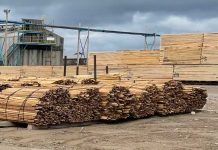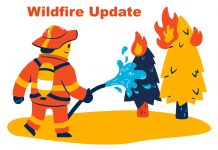 HALIFAX – BUSINESS – The Forest Products Association of Canada (FPAC) released a comprehensive report today that highlights efforts in support of caribou recovery across the country – along with a series of recommendations to the federal government that will help inform solutions to further preserve and enhance habitat for caribou and other species that inhabit Canada’s forests.
HALIFAX – BUSINESS – The Forest Products Association of Canada (FPAC) released a comprehensive report today that highlights efforts in support of caribou recovery across the country – along with a series of recommendations to the federal government that will help inform solutions to further preserve and enhance habitat for caribou and other species that inhabit Canada’s forests.
Forest Sector Contributions to Woodland Caribou Recovery was released today by FPAC CEO Derek Nighbor in conjunction with the annual meeting of the Canadian Council of Forest Ministers in Halifax. The report includes a compendium of projects and initiatives taking place across the country as part of the Canadian forest products sector’s active efforts to support caribou recovery. The report highlights multiple factors impacting caribou populations, and the unique position Canada’sforestry professionals are in to support caribou recovery with science, research, and by advancing on the ground partnerships.
“We are concerned that the role of Traditional Ecological Knowledge (TEK) has largely been absent from Environment and Climate Change Canada caribou policy development. Our Indigenous communities and rights holders within Ontario are taking on an increasingly important leadership role in the management of Ontario‘s Crown forests. Our communities are investing in the sector and even becoming the forest manager and license holder. If through a Federal emergency order or Conservation Agreement, the Federal Government steps into traditional and provincial lands to propose how our forests will be managed, there is a high risk that the progress we have made will be lost,” says Chief Wawia of Red Rock First Nation.
Canada forest products sector is recognized globally as a model for sustainable forest management. Professional foresters across the country plan harvests through the lens of 150+ year timeframes to ensure we can enjoy our Canadian forests for generations to come. They also consider several forest values including fire risk mitigation, protecting watersheds, and preserving wetlands, in addition to maintaining habitat for the over 500 mammals, birds, and fish who call the forest home.
“Caribou recovery planning is one part of this important web of work we undertake in our forests every day,” said FPAC CEO Derek Nighbor. “Today’s report provides insights into a number of the activities that are making a difference in supporting caribou recovery while recognizing it is important to find solutions that consider all wildlife species living in our forests, including caribou. Our made in Canada approach to forest management is rooted in planning for the entire ecosystem which will help us keep our forests healthy for generations to come, and will help us sustain rural and northern communities and family-supporting jobs across Canada,” he added.
To help support the viable implementation of Canada’s Species at Risk Act (SARA) and Recovery Strategies (Boreal and Southern Mountain Caribou), FPAC is committed to continuing our work with federal and provincial governments on the following recommended approaches:
- Recognition and use of the most recent and complete science and knowledge in caribou plans and further commitment to address knowledge gaps
- Regional flexibility is acknowledged in caribou planning (e.g. disturbance thresholds, buffer widths and habitat definitions)
- Recovery Strategy implementation requires that a thorough socio-economic assessment be done with the engagement of impacted parties as well as integrated approaches that balance the needs of other species on the landscape
- Recognition of progressive recovery contribution to date, including the utilization of more tools within SARA, which could include the use of Conservation Agreements and codes and standards to support caribou recovery and allow for greater certainty for our sector to make important community investment decisions
- The inclusion of the forest sector, Indigenous communities, practitioners, and municipalities in the development of caribou plans
“Canada’s forests and forestry workers create real environmental, social, and economic opportunities for our country,” said Nighbor. “This report and its recommendations reflect an ongoing commitment from the dedicated professionals in our sector to work with all levels of government, Indigenous communities, researchers and scientists, and local community groups to support caribou recovery across Canada,” he concluded.
The efforts and initiatives within Forest Sector Contributions to Woodland Caribou Recovery have been undertaken in partnership with a host of leaders from various communities including provincial governments, Indigenous communities, scientists, environmental groups, worker groups, and local municipalities.
“I see the multiple factors impacting caribou in and around my community and the commitment of our forestry workers to do their part to support caribou recovery. Complex problems require creative solutions. These solutions must consider impacts on multiple-species and other values like mitigating fire risks, while supporting good natural resource and tourism jobs in B.C,” remarked Mayor Merlin Nichols District of Chetwynd, B.C.
“The National Council for Air and Stream Improvement (NCASI) caribou research results to date show that nutritional limitations, particularly in summer, are important and should be considered in the design of caribou conservation programs. The results of our decade-long research program will be helpful to both government and industry as they seek ways in which to manage landscapes more effectively to enhance caribou population dynamics,” according to Kirsten Vice, Vice President, Sustainable Manufacturing & Canadian Operations, Montreal, QC.
“Our community and region believe that local solutions are needed to support caribou recovery. Throughout Alberta, we are seeing real benefits from a number of the innovative and diverse caribou programs which are being led by our province’s forestry experts in conjunction with elected officials, the energy sector, and multiple other stakeholders. We must continue to support these initiatives, as a cookie cutter approach will not work. Collaboratively we can ensure the long-term recovery of caribou, and support the economic and social growth of forest-based communities across Canada,” comments Mayor Maryann Chichak of Whitecourt, AB.
“The recovery of the boreal caribou is a very complex issue. I am very impressed with the engagement of our foresters who are working on solutions which take into account local considerations. I believe that when proactive plans are being developed, communities must be consulted to find the best solutions and understand the impact of the plans on our communities,” says Mayor Pascal Cloutier of Dolbeau-Mistassini, Quebec.
“Canada’s forestry workers are proud stewards of our working forests. We need governments to support caribou recovery in a way that looks comprehensively at all factors and doesn’t unfairly threaten family-supporting Canadian jobs,” states Jerry Dias, National President of Unifor.
Forest Sector Contributions to Woodland Caribou Recovery report can be found here.





